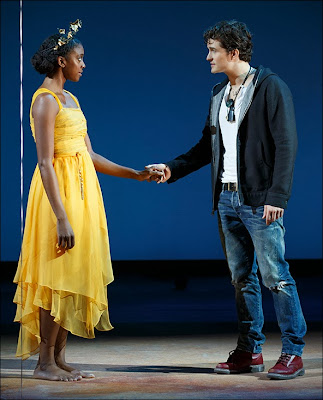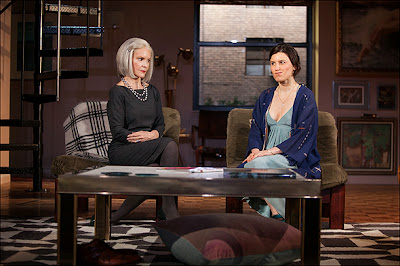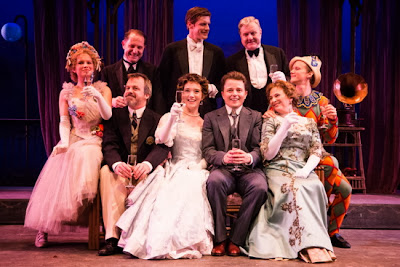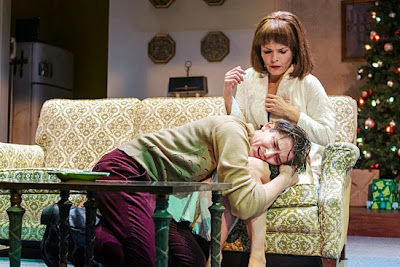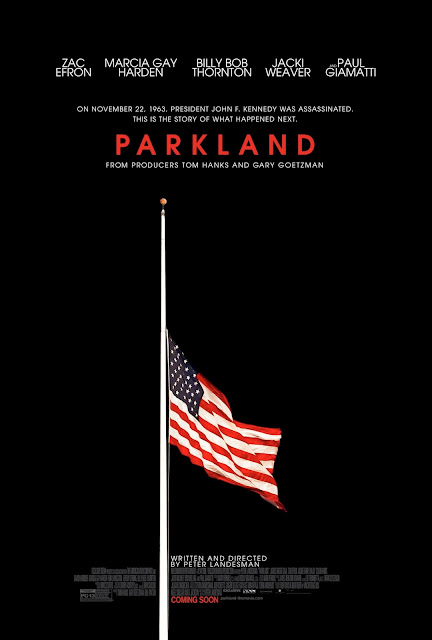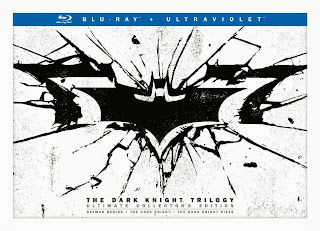- Details
-
Parent Category: Film and the Arts
-
Category: Reviews
-
Published on Monday, 30 September 2013 03:03
-
Written by Kevin Filipski
Arrow—Complete 1st Season
(Warners)
In this robustly entertaining series based on one of DC Comics’ last TV-movie adaptation holdouts, billionaire Oliver Queen’s five years on a deserted island enable him to learn the skills necessary to return to his hometown to fight crime—and settle scores.
Of course, it’s silliness personified but done with cleverness and lack of self-importance—everything The Dark Knight wasn’t—it remains watchable. The Blu-ray image is superb; extras include featurettes, interviews, deleted scenes and a gag reel.
(Warners)
I’ve gone on record expressing my dismay with Christopher Nolan’s ponderous reboot of the Batman franchise with his three Dark Knight films, so I won’t repeat myself.
Instead, let’s praise Warner Brothers for this extraordinary six-Blu-ray disc boxed set, handsomely designed and executed, which will no doubt please the trilogy’s fans.
Included along with the fatally overlong films (all looking perfectly detailed in hi-def) are bonus features galore—90 minutes of new extras including a new making-of—and, inside the box itself, a 48-page photo book and Nolan letter.
(Cohen Media)
Francois Ozon’s latest wispy sleight of hand amusingly adapts Juan Mayorga’s play that literally tackles “reality vs. fiction”: a precocious high school student variously seduces his teacher and his wife, his classmate and the classmate’s mom and dad, with his words and natural charm.
How much is true and how much is made up allow Ozon to display his nimblest filmmaking in years. A choice cast is led by Fabrice Luchini and Kristin Scott Thomas. The hi-def transfer looks great; extras include a gag reel and featurettes.
(Berlin Philharmonic)
This exuberant performance of Mozart’s symbol-laden Masonic singspiel, filmed in Baden Baden, Germany, is a modern staging by director Robert Carsen that doesn’t ruin the work’s atmosphere since Flute doesn’t take place in any specific era or setting.
The singers, led by Pavol Breslik’s touching Tamino and Kate Royal’s ravishing Pamina, are uniformly excellent, and Sir Simon Rattle leads his musicians in a lithe reading of Mozart’s glorious score. The Blu-ray image and audio are first-rate; extras include Carsen and Rattle interviews and behind-the-scenes featurette.
Peter Gabriel—Live in Athens ‘87
(Eagle Vision)
When Peter Gabriel toured in support of 1986’s So album, he became a superstar thanks to hit singles and award-winning MTV videos. The tour, also a massive success, was one of the best concerts ever for those who witnessed it (I saw two shows during that tour), and this 1987 Athens concert is finally on Blu-ray in all its visual and musical glory.
Gabriel and his crack band, playing two hours’ worth of jagged and fractured tunes from his brilliant solo albums, are joined by opening act Youssou N’Dour for emotional encores of “In Your Eyes” and “Biko.” Extras include N’Dour’s 40-minute opening set, vintage Gabriel interview and bonus DVD of Play, comprising 23 Gabriel videos from “Solsbury Hill” to “Growing Up.” Blu-ray image and audio are superlative.
Room 237
(IFC)
In this alternately bemusing and amusing documentary, five people espouse their theories of what Stanley Kubrick’s The Shining is really about, from the Holocaust to Kubrick faking the first moon landing! The Shining is filled with mysterious doings even by Kubrickian standards, and seeming gaffes are heavily fraught with “Meaning” because the exacting Kubrick would never allow a chair to go missing or a typewriter to change color. Or would he?
Director Rodney Ascher has fun with these outlandish theories, but since the movie is itself outlandish—Jack Nicholson’s crazed hamminess would ruin lesser films—it can withstand such thematic hocus-pocus. The Blu-ray image is good; extras include a commentary, panel discussion, 11 deleted scenes and music and poster design featurettes.
3 Films by Roberto Rossellini
(Criterion)
This trio of films Roberto Rossellini made with wife Ingrid Bergman in the early 1950s—Stromboli, Europa 51 and Voyage in Italy—is of historical and cinematic importance, showing Rossellini’s style hardening from his neo-realist roots to the didacticism that would overwhelm his later television films.
Bergman is both radiant and haggard in these films, and despite their lack of melodrama, they really pinpoint a specific postwar Italian era. The five films—included are Stromboli and Europa in Italian and English versions—look splendid in Criterion’s hi-def transfers; the voluminous extras comprise documentaries, commentaries, featurettes, interviews and Rossellini introductions.
Fill the Void
(Sony Classics)
Rama Burshtein made this honest and direct drama about a young Orthodox Jewish woman initially persuaded by her family to marry her dead sister’s widowed husband in order to care for their infant son.
This glimpse into a society most viewers are unaware of absorbingly creates, in a brief 90 minutes, a world of love and forgiveness. In the lead role, actress Hadas Yaron is unforgettable in her naturalness. Extras include Burshtein and Yaron’s commentary and a Burshtein/Yaron Q&A.
(Artsploitation)
In Chilean director Patricio Valladares’ no-holds-barred horror flick, we are subjected to limbs being chain-sawed off, a father having sex with his daughters, their deformed brother eating other people and endless scenes of rape and torture. If that prompts you to want to see it, then nothing I say can change your mind.
It’s well-made and even well-acted—considering what these poor people (especially the women) go through—but the buckets of blood and gore, even considering what Valladares withholds from us, are too much. Extras include a director interview and making-of featurette.
The Mentalist—Complete 5th Season
(Warners)
In this beguiling police procedural’s latest season—which includes its landmark 100th episode—Simon Baker’s sophisticated and sharp-witted investigator Patrick Jane comes back strong after being charged with assault and fraud last season.
Baker’s effortless charm helps smooth over plot holes that gape larger on DVD when no TV commercials separate sequences. Extras include interviews and behind the scenes featurettes.
The Neighbors—Complete 1st Season
(ABC)
Two and a Half Men—Complete 10th Season
(Warners)
Two Broke Girls—Complete 2nd Season
(Warners)
High-concept sitcoms live on: the new The Neighbors, which thinks a neighborhood filled with hidden extraterrestrials is automatically funny, works due to perennially underrated Jami Gertz’s levelheaded presence.
Two and a Half Men, after ten years well past its sell-by date, continues limping along with Ashton Kushter replacing Charlie Sheen, while the surprisingly raunchy Two Broke Girls (comedienne Whitney Cummings is its creator) works because both Beth Behrs and Kat Dannings are fun together—and separately. Extras include making-of featurettes, gag reels and deleted scenes.
(Deutsche Grammophon)
Thomas Ades’ second opera, from Shakespeare’s play, is light years ahead of his first, 1995’s Powder Her Face: the musical and dramatic mastery show a maturity I never expected. (I saw it in 2006 in Santa Fe.) Robert Lepage’s Met Opera staging is filled with welcome restraint, allowing the story, characters and music to take center stage.
Ades conducts a vivid account of his own score, Simon Keenlyside is a powerful Prospero, and Isabel Leonard again demonstrates how far ahead she is of other young sopranos as a luminous Miranda. Extras include host Deborah Voigt’s interviews with the principals.
CDs of the Week
Anna Netrebko—Verdi
(Deutsche Grammophon)
At the beginning of her career, Russian soprano Anna Netrebko sang roles for which her bright soprano was suited, often by fellow Russians like Prokofiev and Glinka. But when she became the opera world’s darling, she started to tackle meatier roles, and that’s what she’s been mainly performing the past several years.
As far as Verdi goes, Netrebko has sung Violetta in La Traviata, but there are many other juicy women’s roles—from Lady Macbeth to Il trovatore’s Lenore—and Netrebko’s creamy voice acquits itself well throughout this recital. Able assistance comes from conductor Gianandrea Noseda and the Turin Opera Orchestra.
Doktor Faust—Ferruccio Busoni
(Warner Classics/Erato)
One of the great—and grossly underrated—operas of all-time is this formidable take on the Faust legend: crammed with memorable music, complex characterizations, truly epic sweep and a knowing sense of drama. A re-release of this 1999 recording—the first complete version of the opera since the classic 1969 version with Dietrich Fischer-Dieskau—is worth seeking out, as Kent Nagano conducts the Lyon Opera Orchestra with the proper balance of expansiveness and intimacy.
In a flawless cast, Dietrich Hensel (Faust), Kim Begley (Mephistopheles) and Fischer-Dieskau himself (speaker) are especially good. There’s also the option to listen to both endings of the operas (Busoni died before completing it).


